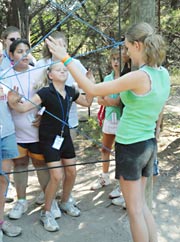Longview church in home of its own
Posted: 7/07/06
Longview church in home of its own
By Laura Frase
Communications Intern
LONGVIEW—As a worship service ends, Pastor Willie Cabrera invites church members and visitors to move from the sanctuary to a fellowship event in the church’s kitchen.
It’s a special time because having a kitchen to move to—or a worship center to move from—marks a new day for Primera Iglesia Bautista in Longview.
Since Primera Iglesia Bautista’s birth in 1977, the church has been without its own facilities until recently.
Mobberly Baptist Church adopted the church in 1984, not long after Mobberly began another Hispanic mission in South Longview in 1983.
Primera Iglesia Bautista has been meeting and worshipping at Mobberly Baptist Church the past six years, but it needed a place to call its own.
Former Primera Iglesia Bautista Pastor Reuben Guerrero explained that when a person stays in another person’s home, it’s awkward—and sometimes rude—to invite people over.
“They will be able to invite them to their own home,” he said. “Now they can say, ‘Come and dine with us.’ That’s their kitchen!”
Mobberly Baptist Church and Primera Iglesia Bautista worked together to raise money for the new facilities. In 30 years, the churches overcame numerous obstacles to purchase the facilities, said Joe Parnell, Mobberly’s minister of missions.
“God’s timing is a mystery,” Parnell said. “We tried to buy this building five years ago, but God did not open these doors. … We didn’t want to put them in debt, and the price and amount of money we had raised at the time would have put them into serious debt.”
“A true blessing” came when Mobberly Baptist Church sold land it purchased several years ago that had appreciated in value, Parnell said. The money was put into Primera Iglesia Bautista’s building fund.
“God finally opened up” the doors, Parnell said. And Primera Iglesia Bautista purchased the building its members now call home.
“We dreamed of this day for a long time,” Parnell said.
“The church has a chance for their vision, their dream to be fulfilled,” Guerrero added.
While the church now has a permanent home, the relationship between the two congregations will continue.
“Our church plans to be part of this ministry,” said Rick Gabehart of Mobberly Baptist Church.
“We plan to work side-by-side to grow.”
The Hispanic congregation feels grateful for Mobberly Baptist Church’s help and continuing support.
“We don’t deserve this place, but we want to dedicate it to God,” Cabrera said. “We look to the future. … For the church, a new life has begun.”


